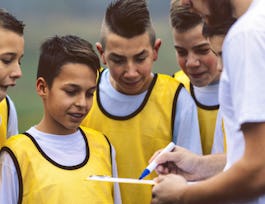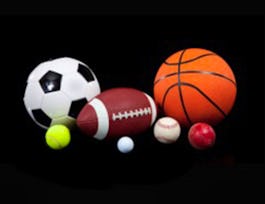In this course you will learn how to design the type of training that takes advantage of the plastic nature of the athlete’s body so you mold the right phenotype for a sport. We explore ways the muscular system can be designed to generate higher force and power and the type of training needed to mold the athlete's physical capacity so it meets the energy and biochemical demands of the sport.


Science of Training Young Athletes Part 2
Taught in English
Some content may not be translated
8,108 already enrolled
(106 reviews)
Details to know

Add to your LinkedIn profile
20 quizzes
See how employees at top companies are mastering in-demand skills


Earn a career certificate
Add this credential to your LinkedIn profile, resume, or CV
Share it on social media and in your performance review

There are 5 modules in this course
In the first topic you are introduced to the fundamentals of training science. This knowledge underlies your ability to design the type of training that will most effectively improve an athlete’s performance. Essential concepts such as homeostasis, core training principles, magnitude and timing of the training stimulus, and periodization theory are all discussed.
What's included
33 videos4 quizzes1 discussion prompt
Training an athlete’s strength and power so it improves their sport performance is a challenging aspect of coaching. Here is the important knowledge you must have: First, you must understand the important terminology such as strength, torque, work and power. Second, you must be able to apply the principle of specificity and transfer of training effects to the athlete’s strength and power development. Third, you must know what peripheral structural adaptations and central adaptations you are trying to accomplish.
What's included
35 videos4 quizzes1 discussion prompt
Fatigue is a phenomenon we all experience. It is characterized by tiredness and the desire to rest. Whether the athlete likes it or not, fatigue serves a protective function. It is both cognitive and physical in nature. In this topic you are introduced to the science of acute fatigue due to training and competition. With rest, acute fatigue dissipates and the body becomes stronger. You will learn about important fatigue theories, and the factors believed to contribute to fatigue such as low fuel supplies, acidity and body temperature.
What's included
33 videos4 quizzes1 discussion prompt
When an athlete is underperforming, and you don’t know why, suspect chronic fatigue due to overtraining as the prime contributing factor. Unfortunately, because we don’t fully understand chronic fatigue our knowledge about overtraining remains scant. Hans Selye’s General Adaptation framework suggests it is likely due to too much training and insufficient recovery that leads to a prolonged maladaptation of physiological systems and structures. In this module you are provided insight into chronic fatigue and its relationship to overtraining.
What's included
43 videos5 quizzes1 discussion prompt
The final topic examines how to organize an athlete’s training so it ensures peak performance. We begin by discussing how to manage the various training effects resulting from a training session. Then we explore methods you can use to quantify training loads and how to taper those loads before a major competition. Finally, you will learn about thinking behind assembling an annual training plan
What's included
20 videos3 quizzes1 peer review1 discussion prompt
Instructor

Offered by
Recommended if you're interested in Personal Development

University of Florida

Duke University

Macquarie University

ESSEC Business School
Why people choose Coursera for their career




Learner reviews
Showing 3 of 106
106 reviews
- 5 stars
94.33%
- 4 stars
5.66%
- 3 stars
0%
- 2 stars
0%
- 1 star
0%
New to Personal Development? Start here.

Open new doors with Coursera Plus
Unlimited access to 7,000+ world-class courses, hands-on projects, and job-ready certificate programs - all included in your subscription
Advance your career with an online degree
Earn a degree from world-class universities - 100% online
Join over 3,400 global companies that choose Coursera for Business
Upskill your employees to excel in the digital economy
Frequently asked questions
Access to lectures and assignments depends on your type of enrollment. If you take a course in audit mode, you will be able to see most course materials for free. To access graded assignments and to earn a Certificate, you will need to purchase the Certificate experience, during or after your audit. If you don't see the audit option:
The course may not offer an audit option. You can try a Free Trial instead, or apply for Financial Aid.
The course may offer 'Full Course, No Certificate' instead. This option lets you see all course materials, submit required assessments, and get a final grade. This also means that you will not be able to purchase a Certificate experience.
When you purchase a Certificate you get access to all course materials, including graded assignments. Upon completing the course, your electronic Certificate will be added to your Accomplishments page - from there, you can print your Certificate or add it to your LinkedIn profile. If you only want to read and view the course content, you can audit the course for free.
You will be eligible for a full refund until two weeks after your payment date, or (for courses that have just launched) until two weeks after the first session of the course begins, whichever is later. You cannot receive a refund once you’ve earned a Course Certificate, even if you complete the course within the two-week refund period. See our full refund policy.


